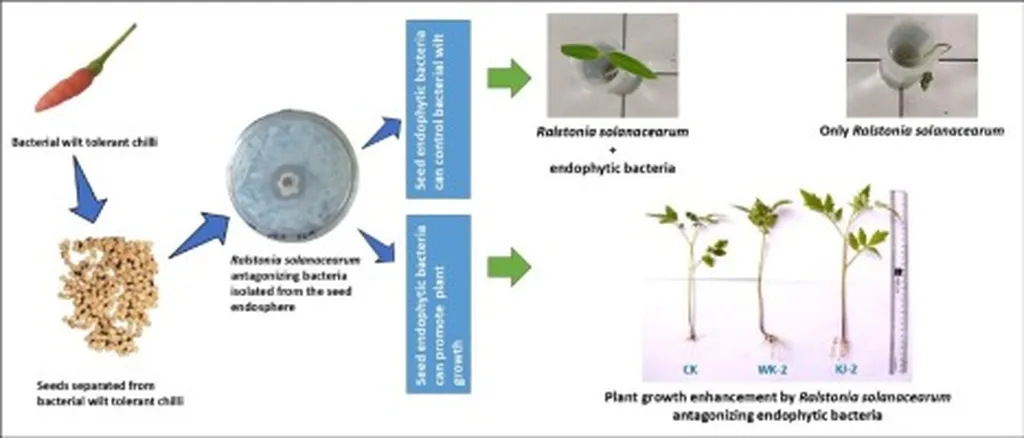In a promising development for sustainable agriculture, researchers have discovered that specific endophytic bacteria can significantly enhance the growth of chili seedlings. This breakthrough, published in the BIO Web of Conferences, could pave the way for more eco-friendly and efficient farming practices, particularly in the cultivation of dicotyledonous plants like chili peppers.
Endophytic bacteria, which live inside plant tissues without causing harm, have long been studied for their potential to promote plant growth. These bacteria often produce Indole Acetic Acid (IAA), a key plant hormone that stimulates growth. Previous research had identified two promising bacterial isolates, K2 and K8, which produced substantial amounts of IAA. However, their effects had only been tested on monocot plants like rice and maize, with limited success. The new study, led by Anjani Aghna Barlinti from the Biology Education department at Universitas Muhammadiyah Surakarta, focused on dicot plants, specifically chili seedlings (Capsicum annum).
The experiment employed a two-factor completely randomized design, inoculating chili seeds with the bacterial isolates before planting them in sterile soil. The researchers measured various growth parameters, including plant height, root number, leaf count, root length, and fresh weight. The results were striking. Both bacterial isolates significantly improved the growth of chili seedlings compared to the control group. Isolate K2 notably increased plant height, while isolate K8 enhanced plant height, leaf growth, and root development.
“This study provides compelling evidence that endophytic bacteria can be a game-changer for dicot plant cultivation,” said Barlinti. “The potential benefits for sustainable agriculture are immense, as these bacteria offer a natural and effective way to boost crop yields without relying on synthetic fertilizers or pesticides.”
The commercial implications for the agriculture sector are substantial. Chili peppers are a valuable crop, widely used in culinary and industrial applications. Enhancing their growth through natural means could lead to increased yields, reduced production costs, and a smaller environmental footprint. Moreover, the findings suggest that endophytic bacteria could be tailored to specific crops, opening up new avenues for targeted agricultural innovations.
“This research is just the beginning,” Barlinti added. “We are excited about the possibilities of exploring more endophytic bacteria and their potential applications in various crops. The future of sustainable agriculture looks brighter with these microscopic allies.”
As the global push for sustainable and eco-friendly agricultural practices gains momentum, this research offers a promising path forward. By harnessing the power of endophytic bacteria, farmers and agritech companies can develop more resilient and productive crops, contributing to food security and environmental conservation. The study’s findings, published in the BIO Web of Conferences, underscore the importance of continued research in this field, paving the way for innovative solutions that benefit both the agriculture sector and the planet.

